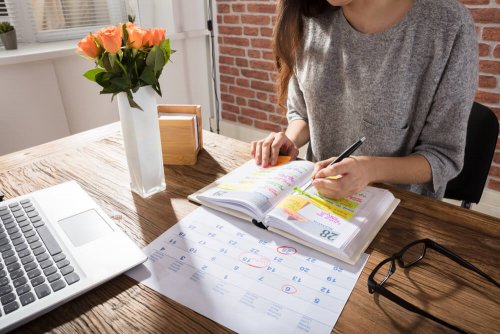How Can I Better Organize My Time?

Why does it seem like everyone else always has more free time than I do? Why do I feel like time is slipping through my fingers? How can I learn to better organize my time? Is it possible to juggle a social life, family, work, and physical and mental health? In this article, we’ll address all of these questions and offer some advice on how to make your hectic schedule work for you.
Everyone has the same amount of time available every day, no one can change that. What you do have control over is how you use that time. In a society that’s becoming more competitive and fast-paced every day, this ability is becoming increasingly important. It can make the difference between landing a job or not or feeling useful or not.
The first strategy for better organization is planning. Spending a few minutes designing your day, week, month, or year helps you effectively prioritize the things you need to do. Also, this perspective of the future can also help you distinguish between what’s urgent and what’s important.
How much time will this specific task take? Ask yourself that question before you do something and give yourself a margin of error. Be honest with yourself and try to consider what unexpected things might come up.
For example, if your plan for today is to go grocery shopping, call a friend, send an email to a coworker, make a special dinner, and finish a presentation, give yourself enough time for each task so that you don’t have to rush. For example, take into account transportation time, unexpected distractions, lines at the supermarket, traffic, etc.

To Better Organize Your Time, Use an Agenda or Your Phone
What kind of agenda or planner should you use to better organize your time? One study conducted at the University of California showed that their students were better at memorization and organization when they wrote things down by hand (as opposed to typing them on a keyboard).
The reason is that writing by hand activates the fine motor area of the brain, which creates deeper impressions on the long-term memory. If you spend time writing things down, your brain will be able to organize ideas and process concepts.
A written agenda helps you create a mental map of your time and your tasks. It’s also a valuable tool for stopping intrusive thoughts because it forces you to focus your energy on what’s actually in your control. Color-coding your agenda can also help you organize your priorities and activate your visual memory. That, in turn, helps your brain retain information.

Organize Your Time and Your Willpower
When you wake up in the morning, your mental energy and willpower have usually recovered from the day before. Consequently, many specialists recommend spending the first hours of the day doing things that you like the least or things that are worrying you. If you wait until later, you’re more likely to procrastinate. That means more things on your to-do list for the next day and more stress.
Your brain also needs space for relaxation. Make sure that you schedule a time during the day for improvisation and creativity. Spending time doing things for pleasure is really important. That means leaving some unscheduled time in your day. Doing it will make you feel good and mitigate the feeling that you’re a slave of your schedule. In fact, a recent study found that it takes 23 minutes to re-focus your attention on something after a distraction.
On the other hand, the more distractions you have around you, the more time you’ll need to get things done. A good workspace and sufficient planning are crucial for productivity and balance. Getting enough sleep, eating a healthy diet, and having enough downtime are also keys to a productive and enjoyable life.
No one gets more hours in the day. We all have the same amount of time for work, study, and play. What makes the difference is how you organize and prioritize your tasks. Make sure to enjoy every second of your time. What are you waiting for?
Why does it seem like everyone else always has more free time than I do? Why do I feel like time is slipping through my fingers? How can I learn to better organize my time? Is it possible to juggle a social life, family, work, and physical and mental health? In this article, we’ll address all of these questions and offer some advice on how to make your hectic schedule work for you.
Everyone has the same amount of time available every day, no one can change that. What you do have control over is how you use that time. In a society that’s becoming more competitive and fast-paced every day, this ability is becoming increasingly important. It can make the difference between landing a job or not or feeling useful or not.
The first strategy for better organization is planning. Spending a few minutes designing your day, week, month, or year helps you effectively prioritize the things you need to do. Also, this perspective of the future can also help you distinguish between what’s urgent and what’s important.
How much time will this specific task take? Ask yourself that question before you do something and give yourself a margin of error. Be honest with yourself and try to consider what unexpected things might come up.
For example, if your plan for today is to go grocery shopping, call a friend, send an email to a coworker, make a special dinner, and finish a presentation, give yourself enough time for each task so that you don’t have to rush. For example, take into account transportation time, unexpected distractions, lines at the supermarket, traffic, etc.

To Better Organize Your Time, Use an Agenda or Your Phone
What kind of agenda or planner should you use to better organize your time? One study conducted at the University of California showed that their students were better at memorization and organization when they wrote things down by hand (as opposed to typing them on a keyboard).
The reason is that writing by hand activates the fine motor area of the brain, which creates deeper impressions on the long-term memory. If you spend time writing things down, your brain will be able to organize ideas and process concepts.
A written agenda helps you create a mental map of your time and your tasks. It’s also a valuable tool for stopping intrusive thoughts because it forces you to focus your energy on what’s actually in your control. Color-coding your agenda can also help you organize your priorities and activate your visual memory. That, in turn, helps your brain retain information.

Organize Your Time and Your Willpower
When you wake up in the morning, your mental energy and willpower have usually recovered from the day before. Consequently, many specialists recommend spending the first hours of the day doing things that you like the least or things that are worrying you. If you wait until later, you’re more likely to procrastinate. That means more things on your to-do list for the next day and more stress.
Your brain also needs space for relaxation. Make sure that you schedule a time during the day for improvisation and creativity. Spending time doing things for pleasure is really important. That means leaving some unscheduled time in your day. Doing it will make you feel good and mitigate the feeling that you’re a slave of your schedule. In fact, a recent study found that it takes 23 minutes to re-focus your attention on something after a distraction.
On the other hand, the more distractions you have around you, the more time you’ll need to get things done. A good workspace and sufficient planning are crucial for productivity and balance. Getting enough sleep, eating a healthy diet, and having enough downtime are also keys to a productive and enjoyable life.
No one gets more hours in the day. We all have the same amount of time for work, study, and play. What makes the difference is how you organize and prioritize your tasks. Make sure to enjoy every second of your time. What are you waiting for?
This text is provided for informational purposes only and does not replace consultation with a professional. If in doubt, consult your specialist.







